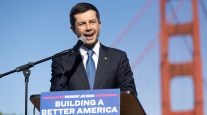Senior Reporter
ATA Chairman Randy Guillot Presses Congress for Infrastructure Funding

[Stay on top of transportation news: Get TTNews in your inbox.]
Investments in infrastructure projects would help states recover economically from the COVID-19 pandemic, a leader of American Trucking Associations told senators June 3.
“Investing in our nation’s failing infrastructure will ensure that we are better equipped to respond to this and future national emergencies,” Randy Guillot, ATA’s chairman of the board, told the Senate Commerce Committee during a hearing that featured freight stakeholders discussing the response to the pandemic. “Additionally, investing in infrastructure will provide a direct stimulus into our nation’s weakened economy.”
“When it comes to funding the roads and bridges that Americans use every day, the trucking industry more than carries its weight — and we’re proud of that fact,” added Guillot, in prepared remarks. He also argued for the need to increase federal funding for big-ticket projects as a way to improve connectivity along freight corridors. The additional funding would target repairs to bridges and tunnels, as well as address urban and rural mobility regions, he said.

How can trucking companies adjust to ensure that essential freight keeps moving while protecting their workers from coronavirus? Host Seth Clevenger speaks with Lilli Chiu of Hub International and Dave Cox of Polaris Transportation. Hear a snippet, above, and get the full program by going to RoadSigns.TTNews.com.
State transportation agencies have recently reported a drop in revenue due to a decrease in traffic volume. The revenue, which stems from the federal fuel tax, is used by the Highway Trust Fund for construction and maintenance projects.
To that point, the ATA chairman proposed the federal government provide $32 billion to transportation agencies. Afterward, a 5-cent increase in the federal fuel tax should be approved followed by additional 5-cent increases over the next three years. Doing so, he explained, would ensure the long-term stability for the Highway Trust Fund.
Other freight stakeholders at the hearing echoed ATA’s sentiment about a need for dedicating additional infrastructure funding.

Willis by Andrew Harrer/Bloomberg News
“When we improve the quality and accessibility of our transportation network, the economic opportunity of those investments extends to every corner of the American economy — from businesses who can move goods quicker and more reliably to workers who can reach new opportunities because of improved highway and transit access,” said Larry Willis, president of the Transportation Trades Department at the AFL-CIO.
“If an infrastructure package is considered in future legislation, increased funding for highway-rail grade crossing and grade separation projects, which communities across the country continue to call for, as well as funding for Amtrak to maintain and replace current critical infrastructure, should also be included,” added Ian Jefferies, president and CEO of the Association of American Railroads.

Jefferies by Andrew Harrer/Bloomberg News
Over the years, ATA has championed the adoption of a fund that would rely on a 20-cents-per-gallon fee, phased in over four years, on motor fuels collected at the wholesale rack.
Guillot, president of Louisiana-based Triple G Express and Southeastern Motor Freight, also recommended Congress proceed with investments in safety programs. Specifically, Congress’ next COVID-19 stimulus package should include incentives to access new, safer, and fuel-efficient equipment, he said. Also, the trucking industry requests the temporary suspension of non-fuel use taxes, the establishment of a freight truck stimulus package, and short-term financial incentives that would accelerate the purchase of U.S.-manufactured trailers.
Additionally, ATA called on Congress to impose certain temporary limitations on the liability of motor carriers for certain crisis-related circumstances.
“Providing limited and narrow liability protections to motor carriers and other industries who have acted in good faith on the front lines of the pandemic will ensure our response and recovery efforts are not assaulted by boundless liability,” Guillot explained.
ATA Chairman Randy Guillot&... by Transport Topics on Scribd
The industry has played a key role during the pandemic through ongoing deliveries to hospitals, grocery stores and other essential areas, the ATA chairman noted. Top officials, such as Transportation Secretary Elaine Chao, have touted the industry’s contributions during the crisis.
“While most activity ground to a halt across the country, America’s 3.5 million professional truck drivers kept moving. These heroes continue serving on the front lines, ensuring everyone has the goods they need to get through these challenging times,” Guillot added.
The committee’s leaders, Sens. Roger Wicker (R-Miss.) and Maria Cantwell (D-Wash.), expressed support for advancing comprehensive infrastructure funding legislation. However, it is unclear if the Senate will include infrastructure funding provisions in their next version of an emergency aid package.
Majority Leader Mitch McConnell (R-Ky.) has stopped short of proposing additional funds for the freight and passenger sectors. The Kentucky Republican said the chamber’s upcoming schedule would consist of nominations, enhancing the implementation of the Paycheck Protection Program for small businesses, and policy bills pertaining to public lands and military affairs.
A $3 trillion measure the House passed last month would provide $15 billion for state highway agencies and slightly more than $15 billion for transit programs. In previous COVID-19 emergency aid approved by Congress, airlines, passenger rail, transit systems, and stakeholders across supply chains were provided financial assistance.
In March, President Donald Trump suggested borrowing $2 trillion for infrastructure projects to alleviate economic challenges caused by the coronavirus.
The Highway Trust Fund is backed by dwindling revenue from the Clinton-era 18.4 cents-per-gallon gas tax and 24.4 cents-per-gallon diesel tax.
Want more news? Listen to today's daily briefing:
Subscribe: Apple Podcasts | Spotify | Amazon Alexa | Google Assistant | More




